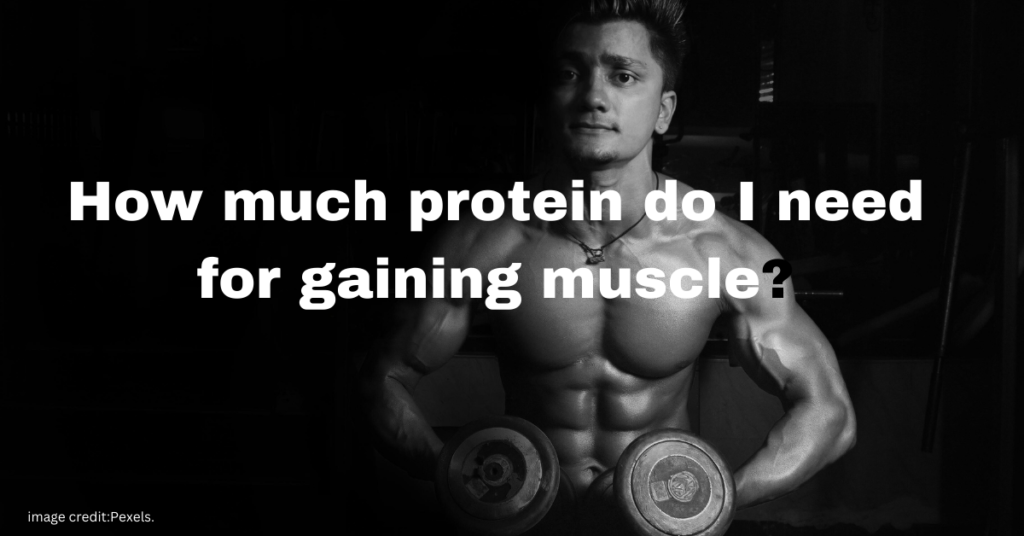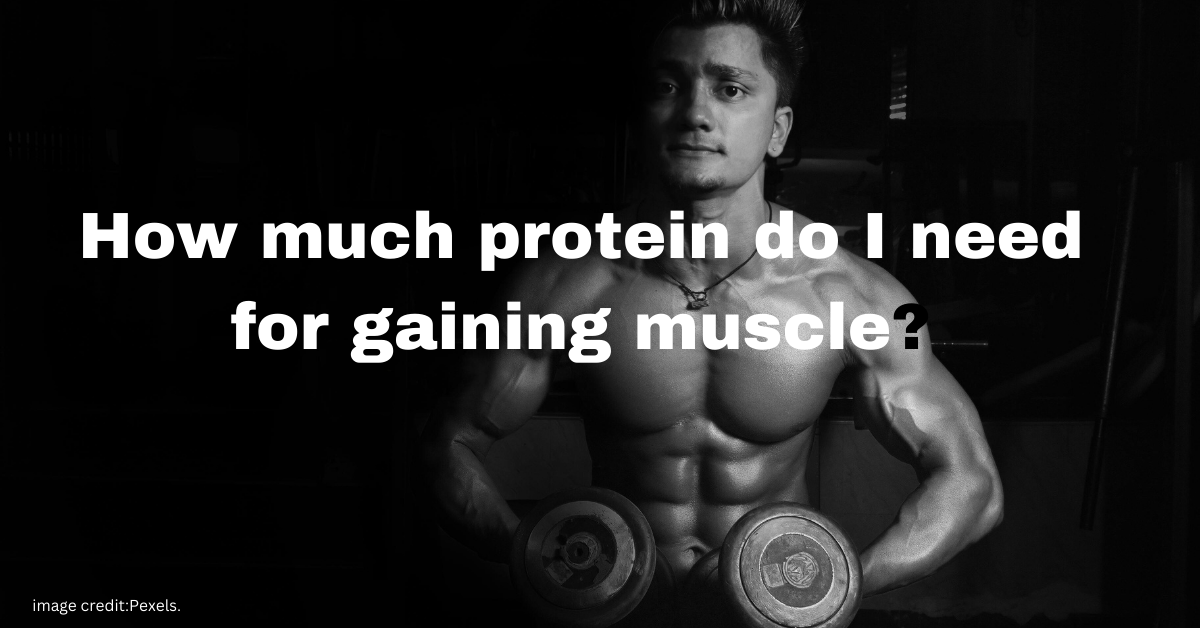When embarking on a journey to gain muscle, one of the most frequently asked questions is, how much protein do I need for gaining muscle? Protein plays a crucial role in muscle growth and repair, making it essential for anyone aiming to increase muscle mass. But determining the right amount of protein can be tricky, as it depends on various factors such as age, gender, workout intensity, and overall diet. In this article, we will explore the significance of protein, factors affecting protein needs, and how much protein you should consume to maximize muscle gain.

Understanding Protein’s Role in Muscle Building
Before delving into the specifics of how much protein you need, it’s important to understand why protein is so crucial for gaining muscle. Protein is made up of amino acids, which are the building blocks of muscle tissue. During exercise, especially strength training, muscle fibers experience small tears. Protein helps repair these fibers, leading to muscle growth.
In addition to aiding recovery, protein also helps with the formation of enzymes, hormones, and other essential molecules. This makes protein an indispensable nutrient for anyone serious about building muscle.
How Much Protein Do I Need for Gaining Muscle? The Basics
The most common question among those looking to gain muscle is how much protein should they consume daily. The general recommendation for protein intake varies depending on a person’s body weight and fitness goals. For someone looking to gain muscle, most experts recommend consuming anywhere between 1.6 to 2.2 grams of protein per kilogram of body weight.
Let’s break that down:
- For example: If you weigh 70 kg (154 pounds), your protein needs would range from 112 to 154 grams of protein per day.
- For those who engage in intense resistance training or are trying to gain muscle rapidly, the higher end of this range may be more appropriate.
Factors Influencing How Much Protein You Need for Gaining Muscle
The amount of protein you need to gain muscle isn’t a one-size-fits-all answer. Several factors affect your protein requirements:
- Training Intensity: The harder you train, the more protein you may need. If you’re lifting heavy weights, doing high-intensity interval training (HIIT), or pushing your muscles to fatigue, your body will require more protein to repair and grow muscle tissue.
- Age: As you age, muscle protein synthesis (the process of building muscle) slows down. Older individuals may need slightly more protein than younger adults to support muscle maintenance and growth.
- Body Composition: If you’re carrying excess body fat, your protein needs might be adjusted based on lean body mass (muscle tissue) rather than total body weight. This ensures that you’re consuming enough protein for muscle growth without over-consuming calories.
- Diet and Nutrient Timing: The timing of your protein intake can also affect muscle gain. Consuming protein evenly throughout the day (at every meal) supports better absorption and utilization by the body. Additionally, consuming protein after a workout can enhance muscle recovery and growth.
The Best Sources of Protein for Gaining Muscle
Now that you know how much protein you need for gaining muscle, it’s essential to choose high-quality protein sources to meet your daily requirement. While protein can come from various foods, certain sources are particularly beneficial for muscle gain due to their amino acid profile and bioavailability.
- Animal-Based Proteins: Animal products are often considered complete proteins because they contain all nine essential amino acids. Some excellent sources include:
- Chicken and Turkey: Lean meats are packed with high-quality protein and low in fat, making them ideal for muscle building.
- Beef: Rich in protein, iron, and creatine, beef is great for muscle growth, especially for those looking for a more calorie-dense option.
- Fish (Salmon, Tuna, etc.): Fish provides high-quality protein along with healthy fats like omega-3 fatty acids, which are beneficial for muscle recovery.
- Plant-Based Proteins: For those following vegetarian or vegan diets, there are several plant-based sources of protein that can help you gain muscle:
- Lentils and Chickpeas: Packed with fiber and protein, they are excellent for muscle building.
- Tofu and Tempeh: These soy-based products are high in protein and contain all nine essential amino acids.
- Quinoa and Brown Rice: While not complete proteins on their own, combining them with beans or legumes makes them a powerful muscle-building combination.
- Dairy Products: Greek yogurt, cottage cheese, and milk are all excellent sources of protein and provide additional nutrients like calcium, which supports bone health—a key factor in lifting heavy weights for muscle gain.
- Protein Supplements: While whole foods should be your primary source of protein, supplements such as whey protein powder can help fill in the gaps, especially for those struggling to meet their protein needs through food alone.
How Much Protein Should You Consume Per Meal for Muscle Gain?
One common misconception is that you need to eat an enormous amount of protein in one sitting to build muscle. However, your body can only absorb and use a limited amount of protein at a time. Research suggests that consuming around 20–40 grams of protein per meal is optimal for muscle protein synthesis.
For example:
- If you consume 120 grams of protein daily, you could aim to have 30 grams of protein at each of your 4 meals.
Distributing your protein intake throughout the day helps maintain a steady supply of amino acids, which promotes consistent muscle repair and growth.
Timing Protein Intake for Maximum Muscle Gain
While the total amount of protein is the most important factor in gaining muscle, protein timing can also enhance the process. Consuming protein around your workouts—before and after exercise—has been shown to have beneficial effects on muscle growth.
- Pre-Workout: Eating protein 1–2 hours before your workout provides your body with amino acids to help prevent muscle breakdown during exercise.
- Post-Workout: After a workout, your muscles are in a repair phase, and consuming protein within 30–60 minutes can accelerate recovery and stimulate muscle growth.
Additionally, if you’re looking to gain muscle, it’s beneficial to consume a small protein-rich snack before bed. This provides your body with a steady supply of amino acids during the night, helping to prevent muscle breakdown while you sleep.
Common Myths About Protein and Muscle Building
As with any popular topic, there are several myths surrounding protein intake for muscle building. Let’s debunk some of them:
- Myth 1: More Protein Equals More Muscle: Simply eating excessive amounts of protein won’t automatically lead to more muscle. In fact, your body will just excrete the excess, and you could end up consuming more calories than necessary, which might lead to unwanted fat gain.
- Myth 2: You Can Only Absorb 20 Grams of Protein at Once: While it’s true that there’s a limit to how much protein your body uses for muscle synthesis at one time, consuming more protein in a single meal isn’t wasted. The extra protein is used for other bodily functions, such as immune support.
- Myth 3: Protein Needs Only Matter for Bodybuilders: While bodybuilders require higher protein amounts, anyone who is exercising regularly—whether it’s for general fitness, weight loss, or strength training—should consider their protein intake to support muscle growth and recovery.
Conclusion: How Much Protein Do I Need for Gaining Muscle?
In summary, the question, how much protein do I need for gaining muscle?, ultimately depends on several factors such as your body weight, training intensity, and overall goals. Most individuals aiming for muscle gain should target around 1.6 to 2.2 grams of protein per kilogram of body weight. Remember, protein is just one piece of the puzzle. To maximize muscle growth, pair adequate protein intake with consistent resistance training, proper rest, and balanced nutrition. By giving your body the protein it needs to build and repair muscle, you’ll be on your way to achieving your muscle-gaining goals

